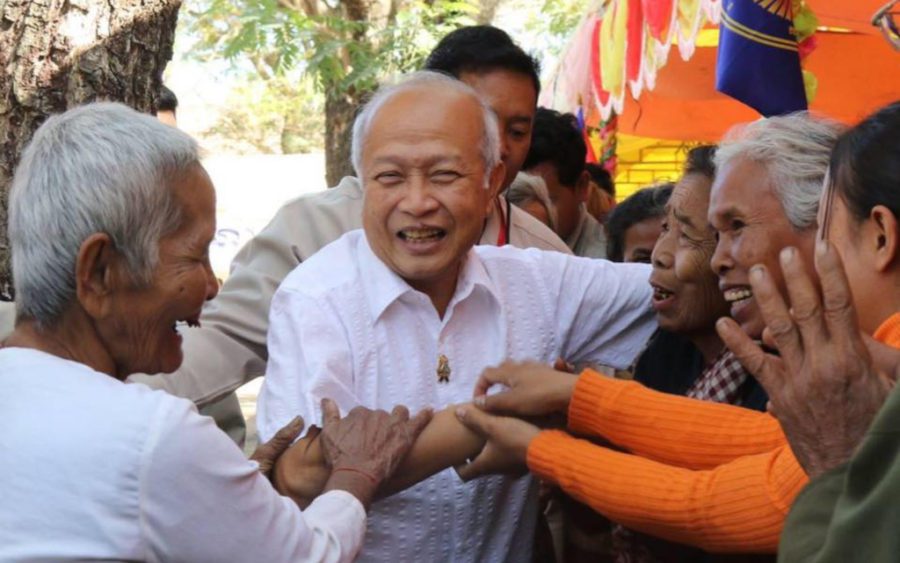Funcinpec leader and former prime minister Prince Norodom Ranariddh died Sunday morning, according to the Funcinpec Party, capping off a turbulent political career that coincided with the country’s emergence as a fledgling democracy in the early 1990s. He was 77.
The former prime minister had been ailing in France and recovering from a car accident he suffered in Preah Sihanouk in 2018, which killed his wife Ouk Phalla. Ranariddh was previously married to Princess Norodom Marie Ranariddh.
Condolences poured in from senior members of the government, including one-time rival Prime Minister Hun Sen, with a Funcinpec official saying Ranariddh’s body would be brought to Cambodia and a state funeral was being organized.
“The passing of Samdech Krom Preah Norodom Ranariddh is the loss of a great royal figure who loves the nation, religion, king with a strong and wise conscience,” Hun Sen said, according to government news agency AKP.
Nhoeun Raden, a spokesperson for Funcinpec, confirmed the prince’s death on Sunday and said the party had decided to nominate Ranariddh’s son, Prince Norodom Chakravuth, to take over the presidency of the party.
Ranariddh led the royalist Funcinpec Party to victory in the U.N.-organized 1993 election, claiming the most seats in parliament but falling short of a majority. However, he was forced to share power with current Prime Minister Hun Sen, who refused to relinquish power and negotiated a split government where he was sworn-in as Cambodia’s second prime minister.
The acrimonious arrangement ended in a bloody “coup” in 1997, with Hun Sen’s CPP gaining political and military control, and winning the 1998 election, with Funcinpec relegated to second place.
Ranariddh fled just prior to the fighting only to return to the country before the 1998 national election, where his party reached a deal to support a CPP-led government — one that has not lost an election since and currently leads a one-party parliament.
Thus began a nearly two-decade slide for Ranariddh and Funcinpec into political irrelevance.
In 2006, a constitutional amendment allowed for a party to form a government with a simple majority in the National Assembly rather than two-thirds, making coalition partners more expendable. Ranariddh, who had negotiated with the CPP to become the assembly’s first president, resigned in protest when two Funcinpec ministers were sacked.
To compound matters, news stories were published attacking the prince for his relationship with an Apsara dancer, Ouk Phalla, who was allegedly working as a conduit to give people government jobs. The controversy escalated and parliament reacted by passing an anti-adultery law.
Ranariddh didn’t take too kindly to these accusations, leaning on the fact that his father, the late king, had multiple wives, and that those accusing him of adultery were equally guilty.
“He who criticizes me is worse than I, but they have no courage and take no responsibility,” Prince Ranariddh told reporters at his party offices in 2006.
“How dare any leader of any party tell the nation that they would never have an [affair]. Secondly, certain persons loved a girl and made her pregnant, but they abandoned her. Some killed them too,” he said.
Then began a nearly 10-year process of the prince leaving Funcinpec, starting new factions of the royalist movement, only to return back to the Funcinpec fold. In the process, loyalists like Nhek Bun Chhay left the party and formed their own parties — though performing poorly at the ballot box.
The prince walked into parliament one last time in November 2017, when the ruling party redistributed the dissolved CNRP’s National Assembly seats to smaller political entities — none of which had won a seat in the 2013 election. Funcinpec was completely sidelined in the 2018 election, failed to win a single seat and fared worse than the total spoiled ballots in the polling.
Prince Thomic Sisowath, a cousin of King Norodom Sihamoni, said he remembered Ranariddh as a kind, gentle and polite man, and within the royal family, he was an ordinary member of the family.
Asked about Ranariddh’s political career, Thomico said the former prime minister was given power by his father, King Sihanouk, when he was made head of Funcinpec.“That is a trademark of the royal family,” Thomico said.
He said Ranariddh’s easy ascension to power meant that he never had the grit to fight political battles and setbacks, which he faced through his career.
“That influenced his political career; he didn’t know how to deal with challenges.”
Additional reporting by Saut Sok Prathna












